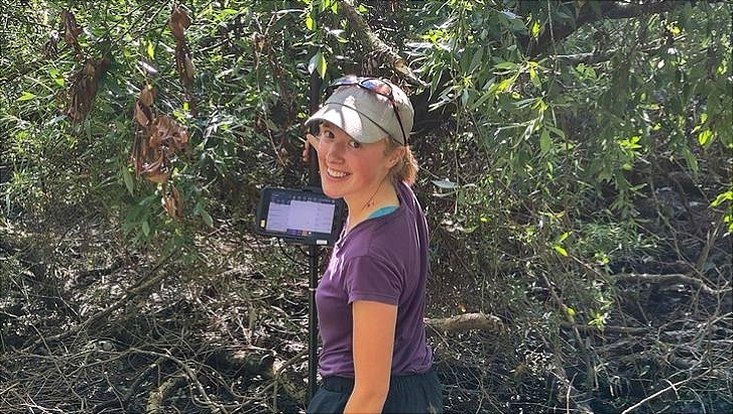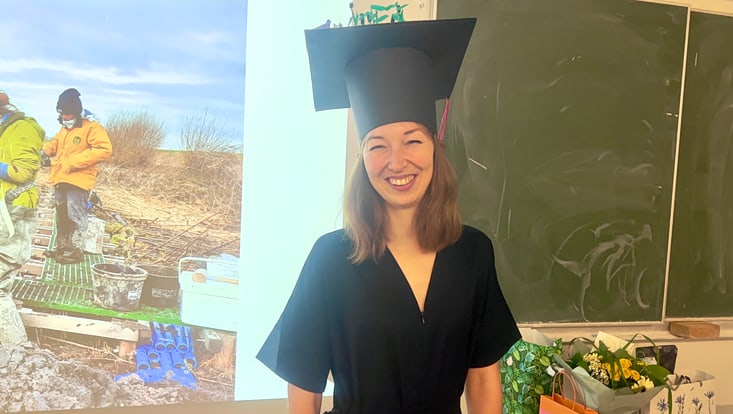An Internship Report by Amelia Englyst RobbExploring the alluvial forests along the Elbe estuary
22 November 2024, by RTG2530

Photo: UHH/RTG2530/Richter
Amelia Englyst Robb was a DAAD RISE intern from 2 July to 22 September 2024, working with Diana Richter, a PhD student in the Research Training Group 2530 and the Functional Forest Ecology working group. The German Academic Exchange Service (DAAD) is an organisation that arranges and supports internships in Germany for international students or abroad for German students. Amelia participated in the DAAD's Research Internships in Science and Engineering (RISE) programme, which promotes international exchange in science and engineering. She has written a report with interesting insights into her time as an intern.
Having completed the first three years of an Integrated Master's programme (equivalent to a Bachelor's degree) in Natural Sciences, specialising in Earth Sciences at the University of Cambridge, I spent this summer as a DAAD RISE intern at the University of Hamburg. The internship focused on soils and carbon cycling in estuarine alluvial forests. With a keen interest in soil, biogeochemistry, and fieldwork and having previously done projects on the nitrogen cycle and water chemistry, I was excited about this project and to work in a new research environment.
As a team of PhD, Master, Bachelor and intern students, we collected soil and root samples, and measured environmental parameters in alluvial forests along the Elbe at Bishorst and Schweenssand, as well as from individual trees in the Elbmarsh at Hollerwettern. It was fascinating to observe and discuss the changes in environmental parameters and in the soil and aggregates within the soil cores. I was also particularly intrigued by investigating the redox processes in the soil – chemical reactions that show, among other things, how oxygen-rich or oxygen-poor conditions affect nutrient availability. We also analysed the samples in the laboratory and investigated the activity of certain enzymes that control important chemical processes in the soil.

UHH/RTG2530/Richter
The study sites ranged from the city's daily flooded alluvial forests on the Süderelbe to individual trees in the Elbmarsch near Hollerwettern. The conditions at the individual stations varied greatly in terms of both spatial and temporal dynamics, which can be attributed to the influence of wind and tide, among other things. A particularly memorable moment was watching bubbles of gas from the forest soil reach the surface during a high spring tide.
I also enjoyed learning about the setup and taking samples at the Marsh Ecosystems Response to Increased Temperature experiment (MERIT) site at the Hamburger Hallig. In addition, I took part in a field campaign investigating below-ground processes at the German Centre for Integrative Biodiversity Research (iDiv) site near Halle.
During my stay, our working group moved to the Institute of Plant Science and Microbiology (IPM). I enjoyed being part of the move and learning from discussions as the new offices and labs were being set up. It has been great to be with the other groups here, to eat together in the Mensa, and get to know more about the broad range of research being carried out.
I was also very fortunate to have the opportunity to attend the Ecological Society of Germany, Austria and Switzerland (GfÖ) 53rd Annual Conference on 'The future of sustainable land use across ecosystems, landscapes and biomes' at the Technical University Munich (TUM) in Freising, 9-13 September 2024. I thoroughly enjoyed attending talks and learning about the wide variety of research in the field of ecology, in particular about soil and nutrient cycling. An excursion to Berchtesgaden National Park, Germany's only national park in the Alps, was also a great environment in which to learn about biogeochemical cycling, biodiversity, and forestry. We had many stimulating discussions, and it was great to connect, including talking about the different ways to measure soil moisture over dinner one evening!

UHH/RTG2530/Robb
I would like to say thank you to everyone for being so welcoming and friendly - and especially to my supervisor, Diana, for being so patient, kind and supporting me. I have learnt a lot, developed my confidence, and greatly enjoyed my time here!
I am excited to start the fourth year of the integrated Master's, now specialising in Quantitative Climate and Environmental Sciences at the University of Cambridge, starting this October. I am also sad to be leaving the group here, as I have thoroughly enjoyed the internship. For my Masters, I would like to continue exploring this area of research and carry out a project on soil science. If the opportunity arises, I would very much like to return to Universität Hamburg in the future!
